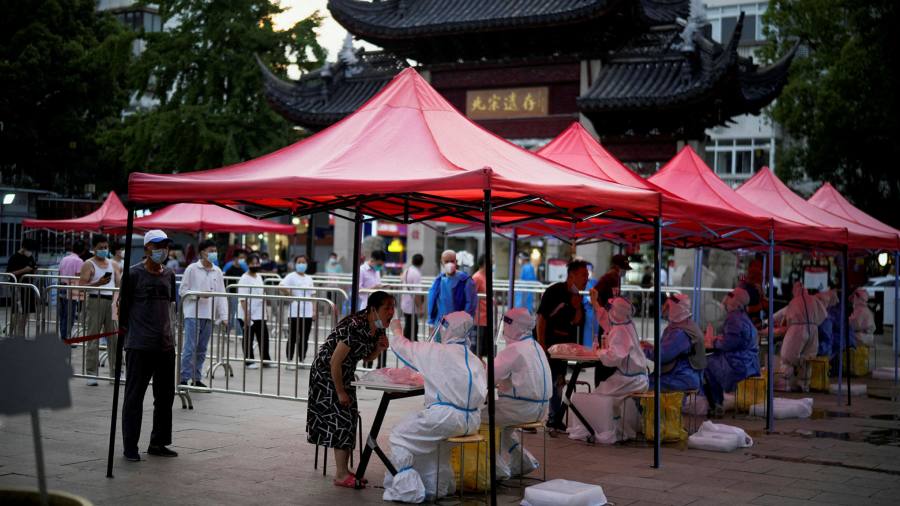China is susceptible to extra frequent lockdowns and mass testing as officers battle to include the unfold of the extremely transmissible BA.5 Omicron subvariant, consultants stated, regardless of the injury restrictions have already wrought on the world’s greatest client market.
Forty-one Chinese language cities are beneath full or partial lockdowns or district-based controls, overlaying 264mn folks in areas that account for about 18.7 per cent of the nation’s financial exercise, in keeping with an evaluation launched on Monday by Japanese funding financial institution Nomura.
That marked a deterioration from the scenario every week in the past, when curbs had been imposed in 31 cities overlaying 247.5mn folks and representing 17.5 per cent of the financial system.
China’s zero-Covid coverage, which goals to eradicate coronavirus utterly, has heaped strain on officers to stamp out chains of transmission and put strains on the world’s second-biggest financial system.
The nation narrowly escaped a contraction within the second quarter, increasing 0.4 per cent yr on yr within the three months to the top of June. That was down from 4.8 per cent within the first quarter, information confirmed on Friday, reflecting the sweeping prices of the current Shanghai lockdown, provide chain disruptions and decreased mobility nationwide.

China recorded 1,090 Covid-19 circumstances over the weekend. However the quantity, whereas comparatively low in contrast with outbreaks in different international locations, was sufficient to set off the resumption of restrictions in cities throughout the nation beneath the zero-Covid regime.
Shanghai’s metropolis authorities has ordered mass testing throughout greater than half of its districts. The announcement sparked fears among the many monetary hub’s 26mn residents {that a} return to intensive lockdowns was imminent, simply weeks after they emerged from a two-month interval consigned to their residences and compounds.
“Folks joke that as long as you’re in lockdown, you’re free from the worry of being locked down,” stated one Shanghai finance skilled who requested to not be named. The skilled added that locals now not trusted the native authorities after its “mismanagement” in March and April.
In Tianjin, south-east of Beijing, the town’s 16mn residents had been ordered on Monday to bear testing and mobility was restricted after two circumstances had been detected. A lockdown was imposed over the weekend within the well-liked southern vacationer vacation spot Beihai and one other was prolonged in Lanzhou, a north-western metropolis of 4mn.

Yanzhong Huang, senior fellow for International Well being on the Council on International Relations think-tank, stated the unfold of BA.5 circumstances in additional Chinese language cities indicated a “new wave of Covid outbreaks”.
“Underneath the present zero-Covid technique, [this] will set off extra frequent and intensive authorities interventions together with mass PCR testing and lockdowns,” stated Huang.
Denis Kinane, professor of immunology and pathology and co-founder of Cignpost Diagnostics, stated speedy mutations of the Omicron variant had been exacerbating the problem posed by China’s huge numbers of unvaccinated aged.
“While China’s stringent lockdowns and border controls had delayed an outbreak of this variant . . . I count on BA.5 to grow to be the dominant pressure in China over the subsequent few months,” Kinane stated.
In accordance with Goldman Sachs information, Chinese language cities with districts categorized as mid- to high-risk coated just below one-quarter of nationwide gross home product.
Property transactions, tracked throughout 30 cities final week, had been down 43 per cent from a yr in the past, whereas subway ridership, one other indicator of financial momentum, remained down 40 per cent in Shanghai and practically 30 per cent in Beijing.
Nonetheless, China’s each day vaccination fee — which analysts say is crucial to hastening a change in its Covid coverage — has remained at low ranges as sources are diverted to mass testing campaigns.
“Zero-Covid is now not sustainable — the virus has developed and grow to be extra transmissible,” Kinane added. “Nations should be pragmatic and alter measures to replicate this.”
Further reporting by Maiqi Ding in Beijing and William Langley in Hong Kong

